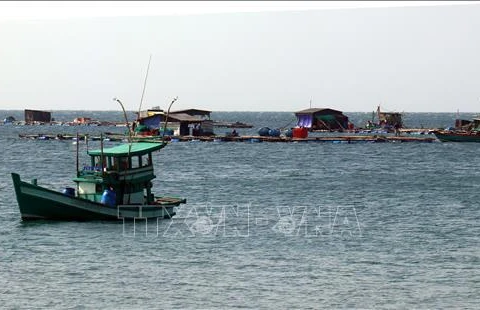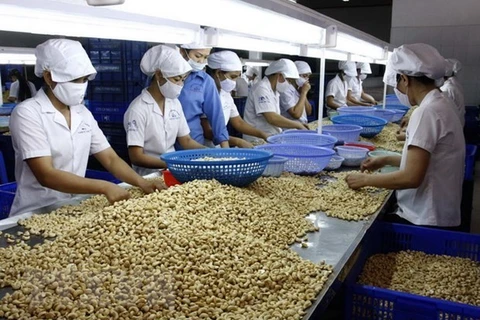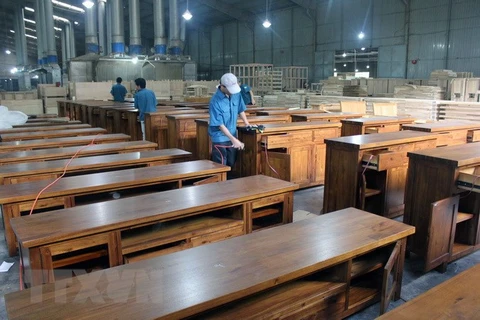HCM City (VNA) – With rosy signs in the second half of last year, Vietnam's fishery sector is expected to post positive growth this year.
According to the Vietnam Association of Seafood Exporters and Producers (VASEP), Vietnam exported 8.4 billion USD worth of aquatic products last year, a slight increase from 2019, of which aquaculture products made up 54 percent.
In January, the total export value was estimated at 600 million USD, a year-on-year rise of 19.6 percent thanks to the sector’s great efforts to boost exports.
Shrimp has maintained its significant role in the country’s aquatic product exports, with revenue forecast to reach 4.4 billion USD in 2021, up 15 percent from the previous year.
The Minh Phu Seafood Joint Stock Company announced on February 17 that the US Customs and Border Protection (CBP) has cancelled a decision issued on October 13, 2020 on the imposition of anti-dumping tariffs on the company’s frozen shrimp products exported to the US.
Its CEO Le Van Quang said the latest CBP decision allows Minh Phu to continue exporting frozen shrimp to the US without being subject to an anti-dumping duty imposed on shrimp from India or any other anti-dumping duties.
Minh Phu has also been refunded anti-dumping duties it temporarily paid under the October 13 decision, Quang added.
Meanwhile, Cambodia is set to raise the standards for aquatic products from neighbouring countries, including Vietnam.
Given this, the Vietnamese Ministry of Agriculture and Rural Development on February 9 issued a document, asking local processors and exporters to get updated on regulations on food quality and safety set by foreign importers.
VASEP predicted that the aquatic product trading would still be impacted by the COVID-19 in the year. However, it said, Vietnam can maintain its competitive edge in material supply.
Moreover, new-generation free trade agreements (FTAs) like the Comprehensive and Progressive Agreement for Trans-Pacific Partnership (CPTPP), the EU-Vietnam Free Trade Agreement (EVFTA), the UK-Vietnam Free Trade Agreement (UKVFTA) and the Regional Comprehensive Economic Partnership (RCEP) will help Vietnam recover its exports in certain markets.
The association suggested the domestic firms establish and implement a product origin tracing system, seriously follow rules of product origin, and fulfill their tax obligations.
An information channel between importers, businesses and management agencies are needed to promptly deal with obstacles in export activities, especially issues relating to aquatic product quality./.
According to the Vietnam Association of Seafood Exporters and Producers (VASEP), Vietnam exported 8.4 billion USD worth of aquatic products last year, a slight increase from 2019, of which aquaculture products made up 54 percent.
In January, the total export value was estimated at 600 million USD, a year-on-year rise of 19.6 percent thanks to the sector’s great efforts to boost exports.
Shrimp has maintained its significant role in the country’s aquatic product exports, with revenue forecast to reach 4.4 billion USD in 2021, up 15 percent from the previous year.
The Minh Phu Seafood Joint Stock Company announced on February 17 that the US Customs and Border Protection (CBP) has cancelled a decision issued on October 13, 2020 on the imposition of anti-dumping tariffs on the company’s frozen shrimp products exported to the US.
Its CEO Le Van Quang said the latest CBP decision allows Minh Phu to continue exporting frozen shrimp to the US without being subject to an anti-dumping duty imposed on shrimp from India or any other anti-dumping duties.
Minh Phu has also been refunded anti-dumping duties it temporarily paid under the October 13 decision, Quang added.
Meanwhile, Cambodia is set to raise the standards for aquatic products from neighbouring countries, including Vietnam.
Given this, the Vietnamese Ministry of Agriculture and Rural Development on February 9 issued a document, asking local processors and exporters to get updated on regulations on food quality and safety set by foreign importers.
VASEP predicted that the aquatic product trading would still be impacted by the COVID-19 in the year. However, it said, Vietnam can maintain its competitive edge in material supply.
Moreover, new-generation free trade agreements (FTAs) like the Comprehensive and Progressive Agreement for Trans-Pacific Partnership (CPTPP), the EU-Vietnam Free Trade Agreement (EVFTA), the UK-Vietnam Free Trade Agreement (UKVFTA) and the Regional Comprehensive Economic Partnership (RCEP) will help Vietnam recover its exports in certain markets.
The association suggested the domestic firms establish and implement a product origin tracing system, seriously follow rules of product origin, and fulfill their tax obligations.
An information channel between importers, businesses and management agencies are needed to promptly deal with obstacles in export activities, especially issues relating to aquatic product quality./.
VNA























